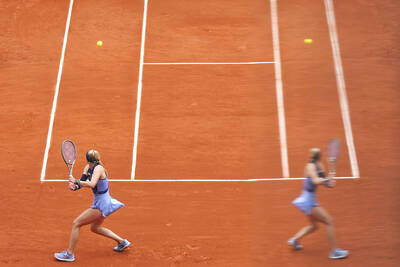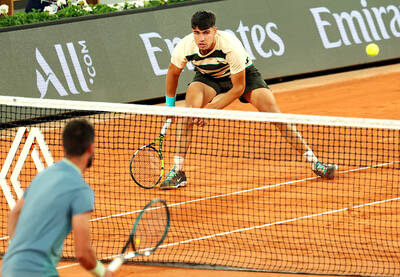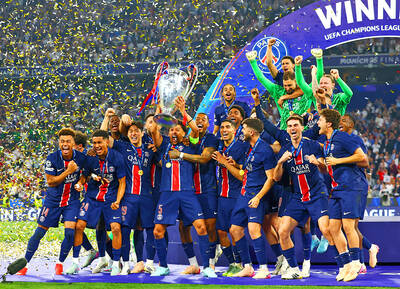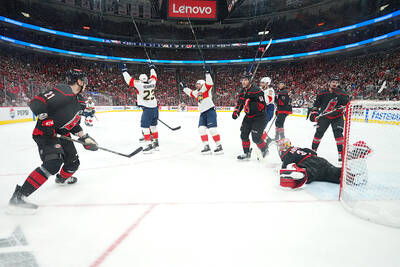Michel Platini, at one time the outstanding French soccer player of his day, dropped by Jerusalem earlier this month. He was received by Israeli President Shimon Peres and the two men discussed what role soccer might play toward peace in the Middle East.
The pair had been down this road once before. Three years ago, Peres and Platini helped put together a team of Israelis and Palestinians who took on a Spanish team in Seville. Now, Platini is the initiator. He visited Jerusalem in his capacity as the head of UEFA and offered Israel the prospect of hosting international tournaments if enough stadiums could be built.
Platini is trying, for a second time, to transform soccer. He fought in his school days for the sport to be an accepted profession in France. He transcended his game as a creator who could and did transform his generation. And he made his fortune in his father’s homeland, with the Italian club Juventus.
But in his second career, the often excruciating transition that professional sports figures face, Platini is taking on an even more difficult task.
Platini seeks something rather complex. He is trying to unite under a common set of operating principles the 53 members of UEFA: 27 states inside the EU and 26 outside it, including the whole of the former Eastern European bloc, and nations that lie outside the geographic borders such as Turkey and Israel. His ambition is to level the playing field between rich teams, those with TV contracts and billionaire owners, and the smaller fry who rely mostly on fan support.
He would like to rein in teams like Real Madrid, which spent US$433 million this summer to buy the rights to four superstars, and the big name teams from the high-level English Premier League. Some of these, like Chelsea and Manchester United, are bankrolled by sugar daddies from Russia, the US and the United Arab Emirates.
In February, Platini addressed the European Parliament for, appropriately, the 90 minutes that it takes to play a soccer match.
In an interview, he spoke about the January trading period, in which star players are transferred for millions of dollars from small market clubs to the dominant teams, which then sign the players to expensive contracts. One club in England, for example, bid US$150 million for the registration of a single player, the Brazilian Ricardo dos Santos Leite, known as Kaka, from AC Milan. (He ultimately signed with Real Madrid.)
“Is it morally acceptable to offer such sums of money for a single player?” Platini asked the lawmakers.
He said he would do everything he could to ensure that soccer operates within European law provided they amend the law to let him govern the sport. To do that, he said, he needed a US-style system that restricted spending to a percentage of every team’s revenues.
“We are currently looking at the idea of limiting, to a certain degree, a club’s expenditure on staff — salary and transfer fees combined — to an as yet undecided percentage of its direct and indirect sporting revenue,” he said.
Platini wanted to restrict the power of big clubs to sign up large numbers of players, particularly those under the age of 18. European law, however, prohibits any quota system that would deny the rights of workers to be employed anywhere they or the clubs choose. Restrictions on competition for players or on the right of workers to seek maximum compensation — familiar fixtures in the landscape of US sports — are illegal.
There were, and possibly still are, members of the European Parliament who believe in the adage that a soccer player is a person whose brains begin in the toes and end at the knees. The skepticism toward an ex-player pleading the case that soccer needs what sports get in the US — some acknowledgment of their special place in society, some freedom to develop their own laws — was palpable.
However, in September the European Commission held a conference on licensing systems for club competitions. This conference, for all sports, broadly supported Platini’s determination to bring big teams within Europe in a scheme to regulate the spending of clubs.
Perhaps just as surprising as the EU arguing the case for UEFA’s new proposals was the fact that Platini’s proposal was backed by leading clubs.
“I am nothing, just one man,” Platini said. “But I was elected by the national associations because I promised to make financial fair play in soccer. I don’t want to be above the law, I know that we could lose in the courts if clubs use lawyers to stop us imposing limitations. I asked the politicians to help protect us, if they trust what we are doing.”

Carlos Alcaraz on Monday powered into the French Open second round with a resounding win to start his title defense, while world No. 1 Jannik Sinner and three-time defending women’s champion Iga Swiatek also progressed at Roland Garros. Four-time Grand Slam champion Alcaraz struck 31 winners in a 6-3, 6-4, 6-2 victory over Italian qualifier Giulio Zeppieri and is to face Hungary’s Fabian Marozsan in round two. Alcaraz is now on an eight-match winning streak at the French Open and also took Olympic silver at Roland Garros last year, losing the final to Novak Djokovic. “The first round is never

FRUSTRATION: Alcaraz made several unforced errors over four sets against Bosnian Damir Dzumhur, who had never made it past the third round in a major competition Defending champion Carlos Alcaraz reached the fourth round of the French Open after laboring past Damir Dzumhur 6-1, 6-3, 4-6, 6-4 in the Friday night session. The second-seeded Spaniard had never before played Dzumhur, a 33-year-old Bosnian who had never been past the third round at any major tournament. “I suffered quite a lot today,” Alcaraz said. “The first two sets was under control, then he started to play more deeply and more aggressively. It was really difficult for me.” Dzumhur hurt his left knee in a fall in the second round, and had treatment on Friday on his right leg during the

‘DREAM’: The 5-0 victory was PSG’s first Champions League title, and the biggest final win by any team in the 70-year history of the top-flight European competition Paris Saint-Germain won the Champions League for the first time as Luis Enrique’s brilliant young side outclassed Inter on Saturday in the most one-sided final ever with teenager Desire Doue scoring twice in an astonishing 5-0 victory. Doue supplied the pass for Achraf Hakimi to give PSG an early lead and the 19-year-old went from provider to finisher as his deflected shot doubled the advantage in the 20th minute. Doue scored again just after the hour mark, ending any doubt about the outcome before Khvicha Kvaratskhelia ran away to get the fourth and substitute Senny Mayulu, another teenager, made it five. Inter were

The horn sounded on Wednesday night to signal a third straight trip to the Stanley Cup Final, as the Florida Panthers celebrated merely by hopping over the boards and several heading over to congratulate goaltender Sergei Bobrovsky. It was a subdued celebration seemingly more befitting a regular-season win for the reigning Cup champs. “I remember a few years ago, it felt like such an accomplishment from where we were at one point,” forward Matthew Tkachuk said, adding: “It’s all business and we’ve got a bigger goal in mind.” The Panthers closed out the Carolina Hurricanes in five games, with a 5-3 victory in